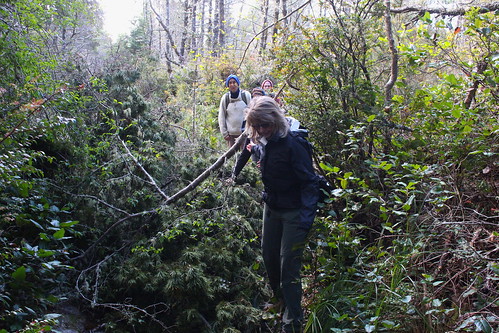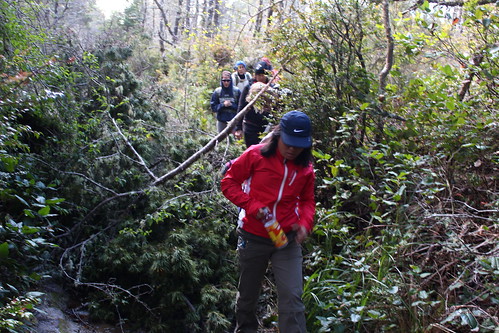Trail through a shady forest














Sherman County weed control Supervisor Rod Asher suggested several ways Azure Farms might be able to control the noxious weeds that other farmers in the area say are spreading to their fields. Owners of the 2,000-acre certified organic farm oppose using herbicides recommended by the county, which warns it will ask the Oregon Department of Agriculture to quarantine the farm if it does not agree to a weed management plan by May 22.
“Your control practices are not destroying the weeds, specifically the root systems that continue to flourish after mowing,” Asher wrote in an April 27 letter to the farm’s parent company.
He suggested:
• “Heavy deep tillage that would rip up and bring the root to the surface,” but said it probably would have to be done every 10 to 14 days through the growing season.
• Covering the weeds with dark plastic or rubber to block out the sunlight. Escaping shoots would have to be cut off during the growing season and the coverage would have to be maintained for multiple years.
• Treatment with organic herbicides. “I am not familiar with any of these so I cannot make a recommendation,” Asher said.
• Treatment with traditional herbicides. The farm would lose organic certification for three years if it uses them.
• Intense burning or “any other method that can effectively destroy the entire plant and root,” Asher wrote.
Sherman County may order owners of a 2,000-acre organic farm to spray noxious weeds or face a possible quarantine.
Local wheat farmers say weeds spreading from Azure Farms, on the outskirts of Moro in north central Oregon, cost them money in the form of additional herbicide control. Most critically, growers of certified wheat seed say their crops will be worthless if contaminated by Rush Skeleton Weed, Canada Thistle, Morning Glory and White Top spreading from the farm.
Spraying the weeds with Milestone or other herbicides, however, would cause the farm to lose organic certification for three years. Azure Standard, which operates Azure Farms, is a major distributor of organic products.
Sherman County gave the farm until May 22 to respond with a weed management plan. If not, the county will ask the Oregon Department of Agriculture to quarantine the farm.
The issue has blown up on social media.
The manager of Azure Farms, Nathan Stelzer, urged supporters to “Overwhelm the Sherman County representatives with your voice.” A video posted on the farm website called for people to express their outrage reportedly has resulted in hundreds of phone calls and thousands of emails to county officials.
The issue may come to a head Wednesday when the county’s Board of Commissioners takes up the issue. Meanwhile, the Oregon Wheat Commission and several growers are meeting with the state agriculture Director Alexis Taylor, hoping to enlist the department’s support.
Oregon Tilth, which certifies organic operations, is calling for calm and urging the county to pause its enforcement timeline. Executive Director Chris Schreiner said Oregon Tilth hopes mediation can result in a weed management plan that allows Azure Farms to retain its certification while addressing concerns of neighboring farmers.
Wheat farmer Bryan Cranston, who grows certified seed next to Azure Farms, said its weed problems have gotten progressively worse over the years. Cranston said he spoke to Selzer and told him, “I don’t drift chemicals on you, I’d appreciate it if weeds don’t drift on me.”
Cranston said he told Selzer, “I grow seed wheat to garner more out of the market, you grow organic to garner more out of the market — we have a lot in common here.”
But he added, “You’re messing me up.”
Cranston estimated weed control in his wheat is costing him $12 per acre more than in the past. He said some weeds, especially skeleton weed, produce airborne seeds and can rapidly infect fields.
Another area farmer, Ryan Thompson, said the county needs to stand its ground on the weed issue.
“These guys are operating by their own set of rules,” he said. “They are not good stewards of the land. They are pretty much using religion and the fact that they’re organic to say our county laws and statutes don’t apply to them.”
The problem has been building for some time. Azure Farms appears to consist of three entities: A parent company, Ecclesia of Sinai at Dufur, in neighboring Wasco County; Azure Standard, in Dufur, which distributes organic products; and Azure Farms, the farmland near Moro, in Sherman County.
In a March 2 letter to Ecclesia of Sinai at Dufur, weed district Supervisor Rod Asher said the noxious weeds “have been found to be growing rampant and unchecked on your properties in Sherman County” and had to be destroyed.
Asher said Sherman County takes weed problems seriously. “The potential damage and economic loss caused by noxious weeds to an agricultural based community can be substantial,” he wrote.
The county warned that it would spray if the farm didn’t, and the cost for multiple surveys throughout the growing season would be billed to the farm as a lien on its property taxes.
Asher said the county could help identify weed, recommend control methods and herbicide products, and had a spray crew for hire if necessary.
In the business’s first response, a letter signed by Alfred Stelzer said Ecclesia of Sinai “is not subject to your direction.” In a three-page letter dated March 27, Stelzer said the farm will not allow any federal, state or county employees to trespass and “spray any toxic or poisonous substances at any time.”
Stelzer said the farm “made a covenant” to keep the “Common Law” of the bible. He cited Numbers 35:34, “which states that the land must not be defiled or polluted.” Stelzer, then released the video and social media plea to supporters, saying the county’s plan was “possibly to spray the whole farm with poisonous herbicides.”
Blake Rowe, CEO of the Oregon Wheat Commission, called the social media campaign “pretty inflammatory.”
The farm has since adopted a more conciliatory position. In a video posted May 12, Azure Standard CEO David Stelzer, the brother of Nathan, acknowledged the farm has “room for improvement.” He said one of the problems is that for the past five years, the family has been farming the Moro property “long distance” from Dufur, which is 48 miles away by vehicle.
David Stelzer said Azure is attempting to improve its ground through crop rotation and “companion planting” of various crops.
“Bio-diversity, a few weeds in the field, does not make a bad farmer,” he said.
Responding to comments he said have been made about the farm, he said it is not affiliated with a religion although they are a “family a faith.” He said Azure properly pays its taxes and provides a $6 million payroll. He said the farm’s wheat yields nearly meet the county average and is of high quality. Eventually, organic farming methods will be “dominant,” he said.
Two decades after she managed to “break out of the cubicle,” Rebecca Landis says she still draws on her time as an “all around bureaucrat.”
These days, Landis applies her experience to the variety of impromptu problems that arise while running two Oregon farmers’ markets, from filing online forms to fixing pop-up tents.
“It’s not really a career path, you just bring to it whatever skills you have,” she said.
Aside from managing the farmers’ markets in Corvallis and Albany, Landis serves as a policy adviser to the Oregon Farmers Markets Association, helping to navigate the regulatory hurdles growers encounter when selling directly to consumers.
The rising prominence and popularity of farmers’ markets in recent years inevitably led to questions about government oversight and food safety.
For example, should the Oregon Department of Agriculture require farmers’ markets to be licensed, as are grocery stores?
Do growers need licenses to sell jams, jellies and similar products that were processed on-farm from their crops?
“It wasn’t clear what was regulated and what wasn’t regulated,” Landis said.
To dispel that confusion, Landis and other experts formed a work group aimed at establishing clear rules for farm-direct marketing.
The resulting legislation, House Bill 2336, was approved by the Oregon Legislature in 2011 with strong bipartisan support.
The bill clarified that farmers’ markets aren’t subject to licensing requirements — unless they refuse to comply with sanitary standards — and sets parameters for which processed goods can be sold in such venues.
“We talked out every product category that might be ripe for a lower level of regulation,” Landis said. “I think it’s stood the test of time so far.”
When a legal uncertainty recently came to light regarding egg sales, Landis lobbied for another bill that allows farmers to sell ungraded eggs as long as they checked them for inner defects with a candling light.
The proposal, House Bill 3116, passed the House and Senate unanimously this year.
The process highlights the improved lines of communication between farm direct marketers and ODA, which supported the bill, Landis said. “That made it easy to proceed with a fix.”
As a member of ODA’s Food Safety Advisory Committee, Landis has helped the agency avoid pitfalls in other proposed food safety legislation, said Stephanie Page, ODA’s food safety director.
The farm-direct marketing bill in 2011 has “provided greater certainty” for growers as well as ODA, Page said. “We see the farmers’ markets as an important partner.”
Landis’ experience with laws and regulations dates back to her job as a legislative analyst in Texas, which she left to move to Oregon with her husband, Larry, in 1991.
After resettling in Corvallis, the couple was involved in starting that city’s farmers’ market.
Landis initially worked for a regional government, managing contracts to provide homeless services, but decided she’d had enough of office work and in 1995 became manager of the Corvallis farmers’ market.
Her arrival as the market’s manager coincided with an emerging curiosity about local agriculture among consumers.
“How stuff was being grown wasn’t discussed in the mainstream culture until 20 years ago,” she said.
Back then, for example, having 14 vendors at the Corvallis farmers’ market would be a “spectacular day,” Landis said. Last year, the number of vendors topped 70.
Expanding a farmers’ market is often a “chicken and egg” proposition — vendors are reluctant to show up unless they can count on lots of visitors, while shoppers aren’t enthusiastic unless they can pick among lots of vendors.
An important trend that’s boosted market attendance is the availability of meat and poultry, which provides stability in comparison to the seasonal fluctuations of fruits and vegetables, Landis said.
Improved payment options have also helped.
Consumers who don’t usually carry cash can now swipe their debit or credit cards at the farmers’ market in exchange for tokens used to pay vendors. Some vendors now accept “plastic” directly, through devices connected to their smartphones.
The ability to pay with food stamps — the USDA’s Supplemental Nutrition Assistance Program, or SNAP — has increased the number of people shopping at farmers’ markets as well.
“None of this existed back in the ’90s at all,” Landis said.
One thing that has remained constant, though, is the connection that farmers’ markets provide between growers and consumers.
Landis said she’s vigilant in ensuring her markets are free of vendors who simply resell wholesale food, since they undermine the venue’s credibility and unfairly compete against actual farmers.
“It’s transparent and traceable to have direct sales,” she said. “There’s a lot of accountability that comes from direct-selling.”
Rebecca Landis
Occupation: Manager of the farmers’ markets in Corvallis and Albany, Ore. Policy adviser to the Oregon Farmers’ Markets Association.
Hometown: Corvallis
Age: 58
Family: Husband, Larry, two cats
Education: Bachelor’s degree in journalism from the University of North Texas in 1980, master’s degree in government from the University of Texas at Austin in 1985
MEDFORD, Ore. (AP) — The Rogue River is higher, faster and has more water than it has for six years, bringing new rafting hazards and a late return for spring chinook salmon.
With a snowpack above Lost Creek Lake now at 123 percent of average, the U.S. Geological Survey’s Northwest River Center is predicting inflows high enough that the U.S. Army Corps of Engineers will be releasing anywhere from 10 percent to nearly double the water from last year into the upper Rogue, depending on the week.
State fishery and water managers are in the midst of finalizing their outflow recommendations into the Rogue through fall, and early drafts call for releases of 3,000 cubic feet per second of water through June and early July, almost twice the releases seen throughout all of July last year.
Outflows into the Rogue are not projected to drop below 2,000 cfs until after Labor Day as water and fish managers grapple with a heavy water year coming just two years removed from a three-year drought — a scenario that will alter salmon runs and rafting activity.
“It’ll be the most water we’ve seen since 2011, and it’s going to change the dynamics considerably,” says Pete Samarin, a fish biologist with the Oregon Department of Fish and Wildlife helping set Lost Creek releases for the maximum benefit of Rogue salmon runs. “There’ll be some concerns. There will be a lot of people on the river who are used to drought conditions.”
The differences from last year to this year will be even more dramatic in the Applegate River Basin, where summer inflows are projected to be 163 percent of average into an already almost-full reservoir.
In the Bear Creek Basin, irrigators have already begun filling canals from reservoirs that are already as full as they are going to get, according to the federal Bureau of Reclamation.
Howard Prairie and Emigrant lakes already are full, while Hyatt Lake is being held at 64 percent of full so contractors can add seismic retrofits to Hyatt Dam.
That has the Talent Irrigation District regularly increasing and decreasing releases from those projects into Bear Creek to ensure those projects don’t overfill — a far different scenario than what plagued the district during drought years.
“High water has its own problems,” TID Manager Jim Pendleton says. “But it’s definitely more fun to work off the tops of these reservoirs than off the bottoms.”
Augmenting summer Rogue flows to enhance chinook salmon runs is the primary rationale behind the water-release strategy crafted each summer by ODFW to get the biggest bang for Lost Creek’s watery investment.
Releases typically are higher in May and June to cool lower Rogue flows and curb natural warmwater diseases during the bulk of the spring chinook push upstream, then releases are upped again in mid-August to do the same for fall chinook.
Flows are backed off in mid-September to corral spawning wild spring chinook in the upper Rogue.
Lost Creek Lake surface levels eyed by wakeboarders and waterskiers are considered secondary benefits for the stored water, and forecasts predict the lake’s two boat ramps will be usable through Labor Day.
River-watchers saw a big taste of what lots of water flowing into an almost-full reservoir looks like last weekend, when a spike in air temperatures triggered a snowmelt that saw runoff into Lost Creek Lake climb on Saturday to 6,800 cfs, with the Corps releases peaking at 6,156 cfs — about twice that of an average early May day, according to the Corps.
That triggered Rogue flows at Dodge Bridge near Eagle Point to record levels for May 6, according to the USGS.
This weekend’s forecast of rain on the snowpack is forecast to trigger another inflow spike that is forecast to peak around 4,670 cfs as the reservoir remains slightly more than a foot from full.
“We’re not even showing us getting back to full again,” says Jim Buck, the Corps Rogue Project operations manager. “But if we were to have that kind of warm weather again next week, we could see some noticeable increases in the inflow.”
| S | M | T | W | T | F | S |
|---|---|---|---|---|---|---|
|
|
|
2 |
|
4 |
5 |
6 |
|
7 |
8 |
9 |
|
|
12 |
13 |
|
14 |
15 |
16 |
|
18 |
19 |
|
|
21 |
22 |
23 |
|
|
26 |
27 |
|
28 |
29 |
30 |
|
|
|
|
Select the newsletter(s) to which you want to subscribe or unsubscribe.